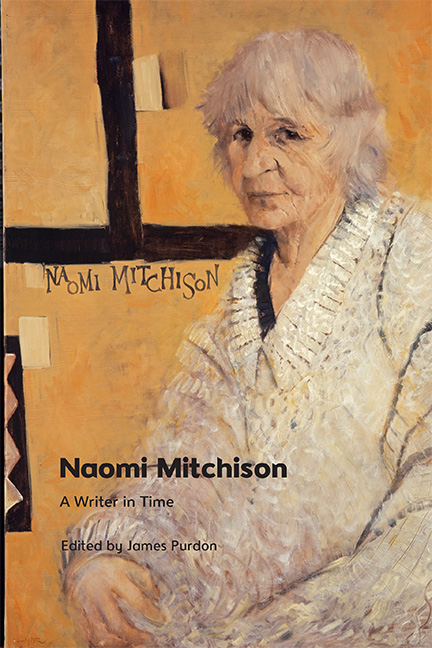Book contents
- Frontmatter
- Contents
- Acknowledgements
- Notes on Contributors
- Introduction
- 1 Naomi Mitchison’s Interwar Short Stories
- 2 ‘She had her hand on the plow’: Shame, Uncertainty and Transformation in The Corn King and the Spring Queen
- 3 Varieties of Sexual Experience: Naomi Mitchison, Mysticism and Gerald Heard
- 4 Scientific Temporalities in We Have Been Warned and ‘Beyond This Limit’
- 5 Send in the Clones? Naomi Mitchison and the Politics of Reproduction and Motherhood
- 6 From Argyll with Love: Naomi Mitchison and the Soviet Union
- 7 Fire or Blood? Aestheticising Resistance in Naomi Mitchison’s The Blood of the Martyrs
- 8 ‘The summoning urgent thing’: The Bull Calves and the Drive to Experiment at Mid-Century
- 9 Mitchison, Decolonisation and African Modernity
- Naomi Mitchison’s ‘Europe’
- Europe
- Bibliography
- Index
2 - ‘She had her hand on the plow’: Shame, Uncertainty and Transformation in The Corn King and the Spring Queen
Published online by Cambridge University Press: 18 November 2023
- Frontmatter
- Contents
- Acknowledgements
- Notes on Contributors
- Introduction
- 1 Naomi Mitchison’s Interwar Short Stories
- 2 ‘She had her hand on the plow’: Shame, Uncertainty and Transformation in The Corn King and the Spring Queen
- 3 Varieties of Sexual Experience: Naomi Mitchison, Mysticism and Gerald Heard
- 4 Scientific Temporalities in We Have Been Warned and ‘Beyond This Limit’
- 5 Send in the Clones? Naomi Mitchison and the Politics of Reproduction and Motherhood
- 6 From Argyll with Love: Naomi Mitchison and the Soviet Union
- 7 Fire or Blood? Aestheticising Resistance in Naomi Mitchison’s The Blood of the Martyrs
- 8 ‘The summoning urgent thing’: The Bull Calves and the Drive to Experiment at Mid-Century
- 9 Mitchison, Decolonisation and African Modernity
- Naomi Mitchison’s ‘Europe’
- Europe
- Bibliography
- Index
Summary
And Jesus said unto him, No man, having put his hand to the plough, and looking back, is fit for the kingdom of God.
Luke 9:62When you put your hand to the plow, you can’t put it down until you get to the end of the row.
Alice Paul, 1920Naomi Mitchison has been the subject of a mixed critical reception since the 1930s. Two of the major novels she wrote in that decade, The Corn King and the Spring Queen (1931) and We Have Been Warned (1935), elicited very different responses despite focusing on similar themes of social change and female agency. While the literary reception of British fiction in the 1930s is also now in a state of flux, until relatively recently the decade was mythologised as ‘the Thirties’, characterised by a seemingly unique conjunction of literature and communist-inflected popular-front politics. From such a perspective, Mitchison has always appeared a curiously marginal figure. She is mentioned only cursorily in influential critical texts, such as Samuel Hynes’s The Auden Generation (1972) and Valentine Cunningham’s British Writers of the Thirties (1988), and even the more extensive discussion in Janet Montefiore’s Men and Women Writers of the 1930s (1996), which corrects the masculine bias of earlier canonical constructions of the decade, takes pains to identify her as a liberal feminist in sharp contrast to ‘Marxist contemporaries’. In this chapter, I am concerned with situating Mitchison within a different context that allows us to judge her work for what it is rather than by the standards of what it is not. In particular, my aim is to show that The Corn King and the Spring Queen reflects Mitchison’s desire to push on from the equal voting rights for women achieved through the Equal Franchise Act of 1928 in pursuit of a much more fundamental transformation of gender roles within society.
Early on in the novel, Mitchison’s protagonist, the titular Spring Queen Erif Der, is described as having ‘her hand on the plow’. This phrase refers to the biblical verse of Luke 9:62, featured variously in gospel songs and the culture of the US Civil Rights movement.
- Type
- Chapter
- Information
- Naomi MitchisonA Writer in Time, pp. 30 - 43Publisher: Edinburgh University PressPrint publication year: 2023

